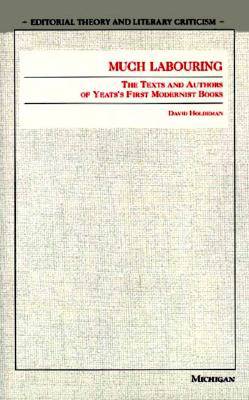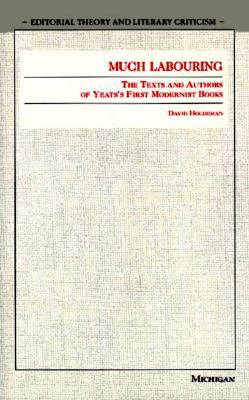
- Afhalen na 1 uur in een winkel met voorraad
- Gratis thuislevering in België vanaf € 30
- Ruim aanbod met 7 miljoen producten
- Afhalen na 1 uur in een winkel met voorraad
- Gratis thuislevering in België vanaf € 30
- Ruim aanbod met 7 miljoen producten
Zoeken
€ 144,45
+ 288 punten
Omschrijving
With a career stretching from the last years of the nineteenth century well into the 1930s, William Butler Yeats is perceived as a key figure in the transition from Romanticism to modernism in English literature. In Much Labouring David Holdeman opens up new paths of thinking about Yeats's modernism by paying close attention to the production of his early books as well as to their publication histories.
Two characteristics stand out in Yeats's career. First, there was his intricate interaction with collaborators, including his sister E. C. Yeats, to produce fine books in which the deliberate use of the page created meaningful relationships among the poems. These collaborative works revealed tangled ideological commitments to Irish cultural nationalism, to women's emancipation, and to wealthy book collectors. Second, there was Yeats's attachment to pervasive, repeated revision of his own work--the struggle to extend his authority over its reception.
Yet without an understanding of how publishers compromised Yeats's intentions in order to capitalize on the success of his early work, the richness of these characteristics is lost, and Yeats's image flattened. Holdeman restores to the picture a sense of the textual processes that qualify Yeats's perceived ideological commitments, giving a fuller understanding of what the poet was up to.
Although Much Labouring will particularly interest students of modernism, the uncommon significance of Yeats's textual experiments suggests new perspectives on interpretive and editorial theories and practices generally.
David Holdeman is Assistant Professor of English, University of North Texas.
Two characteristics stand out in Yeats's career. First, there was his intricate interaction with collaborators, including his sister E. C. Yeats, to produce fine books in which the deliberate use of the page created meaningful relationships among the poems. These collaborative works revealed tangled ideological commitments to Irish cultural nationalism, to women's emancipation, and to wealthy book collectors. Second, there was Yeats's attachment to pervasive, repeated revision of his own work--the struggle to extend his authority over its reception.
Yet without an understanding of how publishers compromised Yeats's intentions in order to capitalize on the success of his early work, the richness of these characteristics is lost, and Yeats's image flattened. Holdeman restores to the picture a sense of the textual processes that qualify Yeats's perceived ideological commitments, giving a fuller understanding of what the poet was up to.
Although Much Labouring will particularly interest students of modernism, the uncommon significance of Yeats's textual experiments suggests new perspectives on interpretive and editorial theories and practices generally.
David Holdeman is Assistant Professor of English, University of North Texas.
Specificaties
Betrokkenen
- Auteur(s):
- Uitgeverij:
Inhoud
- Aantal bladzijden:
- 272
- Taal:
- Engels
- Reeks:
Eigenschappen
- Productcode (EAN):
- 9780472108510
- Verschijningsdatum:
- 3/12/1997
- Uitvoering:
- Hardcover
- Formaat:
- Genaaid
- Afmetingen:
- 162 mm x 237 mm
- Gewicht:
- 635 g

Alleen bij Standaard Boekhandel
+ 288 punten op je klantenkaart van Standaard Boekhandel
Beoordelingen
We publiceren alleen reviews die voldoen aan de voorwaarden voor reviews. Bekijk onze voorwaarden voor reviews.







